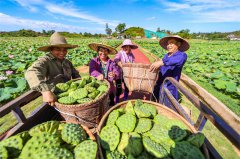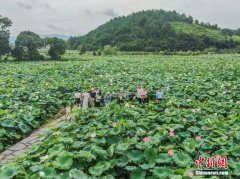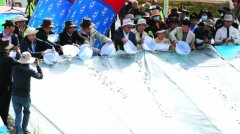Home>>
Feature: China-Africa cooperation boosts sustainable development in Lake Victoria region(Xinhua) 15:45, March 26, 2025
NANCHANG/NAIROBI, March 26 (Xinhua) -- As the largest freshwater lakes in China and Africa, respectively, Poyang Lake and Lake Victoria have witnessed a cross-continental collaboration for sustainable development and ecological preservation.
In recent years, China's Jiangxi Province, home to Poyang Lake, has strengthened its cooperation with Kenya, Tanzania and other nations bordering Lake Victoria. By sharing their expertise in lake management, the province and its partners have injected fresh momentum into China-Africa efforts toward eco-friendly modernization.
CROSS-CONTINENTAL COLLABORATION
In Kenya's Tanyoka community, located on the northeastern shore of Lake Victoria, traditional cooking methods have given way to energy-efficient clay stoves. Introduced by Chinese experts from Jiangxi Province, these stoves increase fuel efficiency by up to 50 percent.
Crafted from locally sourced materials, the stoves are easy to produce and offer residents an opportunity to generate additional income through sales.
The adoption of these stoves has brought benefits to the community. Reduced firewood consumption aids forest conservation and alleviates the burden on women and children who traditionally gather wood.
"Since fully cooking our food with these stoves, we have not experienced severe cholera outbreaks in recent years," said Elsa Anyango, deputy secretary of the Tanyoka community.
Xu Weimin, party secretary of the Jiangxi Research Academy of Ecological Civilization, who visited the Lake Victoria region last year, said that the lake faces challenges similar to those once encountered by Poyang Lake, including soil erosion and wetland degradation.
Lake Victoria is the chief reservoir of the Nile, while Poyang Lake connects with the Yangtze River. Both lakes serve as vital water sources, supporting millions of people and providing habitats for diverse wildlife.
In recent years, with support from organizations such as the Global South-South Development Center Project and the United Nations Perez-Guerrero Trust Fund, Poyang Lake and Lake Victoria, both members of the Living Lakes Network, have joined forces to address these shared challenges.
SHARED KNOWLEDGE, TAILORED APPROACHES
The collaboration has facilitated knowledge exchange between Jiangxi Province and the countries surrounding Lake Victoria, including Uganda, Tanzania and Kenya.
Initiatives have included training programs on cultivating high-value crops such as tomatoes, peppers and cucumbers; promoting eco-friendly practices like integrating duck farming in rice paddies to control pests and weeds, thereby reducing pesticide use; and demonstrating biogas fermentation and solar power generation to provide clean energy solutions.
Chinese experts shared successful strategies used in Poyang Lake's restoration, and adapted them to suit the specific conditions of the Lake Victoria basin.
In Homa Bay, along Lake Victoria, sustainable agriculture trials are underway. Eric Ochieng, chairman of the KAMSER Shoreline Youth Group, along with over 30 members, is engaged in organic farming of vegetables, sugarcane, and legumes under the guidance of Chinese agricultural specialists.
"By avoiding chemical fertilizers, we reduce nutrient pollution in the lake. Agroforestry practices help prevent soil erosion, and our organic produce commands better prices," Ochieng said. "We are confident in organic farming because these models have been proven effective in Poyang Lake."
Recognizing the need for localized solutions, Chinese experts adjusted their approaches to suit Lake Victoria's context. Initially considering comprehensive watershed management plans, they revised their strategies upon discovering limitations in remote sensing data, environmental monitoring equipment, and cross-border coordination.
Focusing on "small yet impactful" initiatives, Jiangxi Province has provided funding and technical support for community projects such as improving sanitation facilities, rainwater harvesting, afforestation, and sustainable farming practices. Training programs have expanded beyond government officials to include environmental organizations and community members.
Upon returning to Lake Victoria after five years, Mao Yuting, an associate researcher with the Jiangxi Research Academy of Ecological Civilization, noted the progress: restaurants installing biogas systems to utilize kitchen waste as cooking fuel, and residents planting fruit trees such as mangoes, papayas and bananas while engaging in poultry farming-practices reminiscent of those in the Poyang Lake region.
ADVANCING GREEN DEVELOPMENT TOGETHER
Despite Africa's abundant bee populations, honey yields remain low due to technical challenges. Chinese experts have provided guidance on beekeeping techniques to enhance honey production across the continent.










